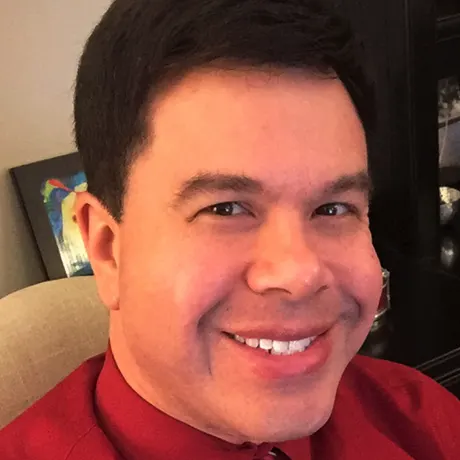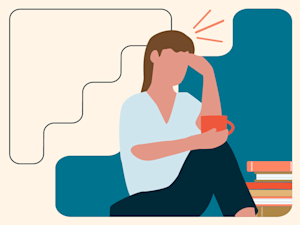Stay in the know
All our latest podcasts delivered right to your inbox.
How do doctors test adults for ADHD? What kind of questions do they ask? How long does it take? Understood Explains host Dr. Roberto Olivardia breaks down the process and explains what to look for in a thorough evaluation. Get an overview and answers to common questions:
What does an ADHD evaluation look like? [00:51]
So, what are ADHD rating scales? [03:48]
How long does this whole testing process take? [04:59]
What is the diagnostic criteria for ADHD in adults? [06:02]
Why is it so important to be open and honest during an ADHD evaluation? [07:42]
Key takeaway, next episode, and credits [08:31]
Related resources
Episode transcript
You’re listening to Season 2 of Understood Explains: ADHD Diagnosis in Adults.
Today, we’re going to talk about what happens in an ADHD test for adults.
My name is Dr. Roberto Olivardia, and I’m a clinical psychologist with more than 20 years of experience evaluating people for things like ADHD. I’m also one of the millions of people who have been diagnosed with ADHD as an adult. I’ll be your host.
My goal here is to answer the most common questions about ADHD diagnosis. Along the way, you’ll learn a lot about ADHD in general.
We’re going to do this quickly — in the next 10 or so minutes. So, let’s get to it.
What does an ADHD evaluation look like? [00:51]
First, I want to tell you what the testing doesn’t look like.
There are no blood tests, no hooking you up to a machine, no brain scans — nothing like what you might see in other parts of a medical facility.
In a nutshell, an ADHD evaluation tends to involve some multiple-choice questions and a wide-ranging conversation with a trained professional, like the kinds of providers we talked about in Episode 2.
OK, so now let’s drill down into five key components of ADHD testing:
The first is patient history — getting to know your past.
The provider will ask for information about your childhood, including your birth weight and developmental milestones, like when you learned to walk and talk.
This is also when it’s good to share details about any hospitalizations, as well as any ongoing health issues you might have.
The second big part asks open-ended questions about different aspects of your life, like school, work, relationships, sleep patterns, appetite, etc.
This is all essential for the evaluator to know, because ADHD can impact so many different aspects of daily life. But it can also affect different people in different ways.
Let’s look at sleep, for example. If you say you don’t get enough sleep, the evaluator can really dig into this area:
Do you have trouble falling asleep, but then you sleep like a rock and it takes four alarm clocks to wake you up?
Or do you have trouble staying asleep because every little noise wakes you up?
Is your sleep disrupted because you’re drinking too much and keep getting up to go to the bathroom?
Another example is the evaluator asking open-ended questions about school. If you say you were an A student, the evaluator might ask what went into getting those A’s.
Did you have to pull a lot of all-nighters?
Were your parents very involved in structuring your schedule?
Did the wheels fall off when you went to college or got your first job?
The third part is a questionnaire that asks a bunch of quick questions using what’s called an ADHD rating scale, which we’ll get into in the next section. But before we jump to that…
Another really important part of an ADHD evaluation asks about other conditions.
For example, maybe your symptoms are pointing to something that looks a lot like ADHD or that often co-occurs with ADHD, such as anxiety, depression, or obsessive-compulsive disorder. That’s really, really important to keep in mind.
And the last big part of the process that I want to highlight is meeting again with the provider to go over the evaluation report. This report is typically several pages long and should sound like whoever did the testing really got to know you. The report should also include recommendations on how to help.
If you notice any inaccuracies or need clarifications, you should raise those concerns with the evaluator right away.
And if you need certain recommendations spelled out so you can get accommodations at work or maybe for college or grad school, talk with the evaluator about that too.
So, what are ADHD rating scales? [03:48]
You’ll probably hear the phrase “rating scale” quite a bit during the ADHD diagnosis process.
Essentially, it’s a questionnaire — a series of brief multiple-choice questions that you might fill out at home, or in-person with the evaluator.
These scales ask you to rate how often you experience behaviors related to ADHD, like running late to important events or making careless mistakes when you’re working on a boring project.
The answers you’re choosing from are typically something like “never,” “occasionally,” “often,” or “very often.”
There are several different versions of rating scales, but they’re all working toward the same goal and are a key part of a comprehensive evaluation.
Generally, different providers tend to use whichever questionnaire or rating scale they like best and fill in any gaps during the one-on-one conversation or clinical interview.
Sometimes, an evaluator may also ask someone who knows you very well — like a spouse or roommate — to fill out a questionnaire. Getting other people’s perspectives is commonly done when kids are being tested for ADHD, but it can help with adult diagnosis too.
How long does this whole testing process take? [04:59]
The length of time an evaluation takes can really vary from person to person.
I’ve had some thorough evaluations take an hour to complete. Others have taken four or five hours. Some could be finished in one visit. Others need to be spread out over a number of visits.
But in general, the process tends to break down like this:
The ADHD rating scales typically take anywhere from 10 minutes to 45 minutes to fill out.
The patient history and other open-ended questions may take an hour or so.
And then there’s the follow-up, where the evaluator explains the results and recommendations. This typically takes an hour too.
There are lots of possible reasons why some evaluations take longer than others…
Like if there’s a lot of personal history to review, or if there are any co-occurring conditions to go over in addition to possible ADHD.
The timing also depends on how quickly the provider and patient are able to move through these conversations.
What is the diagnostic criteria for ADHD in adults? [06:02]
There are three official types of ADHD, and each has a different threshold that patients must meet for a diagnosis.
There’s the inattentive type of ADHD, which used to be called “attention-deficit disorder,” or ADD. Patients need at least six symptoms of inattention for a diagnosis.
To be diagnosed with the hyperactive/impulsive type of ADHD, a patient needs at least six symptoms of hyperactivity or impulsivity.
Many folks have a third kind, which is called the “combined type of ADHD,” where you qualify for both types I just mentioned.
The official diagnostic guidelines are part of a big manual that’s called the Diagnostic and Statistical Manual of Mental Disorders, or DSM.
The DSM lists the criteria for the three kinds of ADHD.
These guidelines are also looking to see if you started having symptoms before a certain age and if you’re having symptoms in two or more settings, like home and work.
But these criteria are all really nuanced, which is why it’s so important to talk one-on-one with the evaluator.
For example, it may seem like you’re mainly struggling in one area, like time management. But that one area could have a huge, negative impact on your life — like getting fired, losing friends, not achieving goals, etc. Context is also really, really important. For example, are you noticing fewer symptoms in some settings because you’re getting more support in those areas? A highly trained evaluator can suss out these kinds of things during your one-on-one conversations.
Why is it so important to be open and honest during an ADHD evaluation? [07:42]
As you’re going through the ADHD evaluation process and you’re filling out the rating scales, it’s pretty easy to guess which “often” and “very often” answers lead to an ADHD diagnosis.
But I want to caution you against trying to answer in a way to ensure you get a diagnosis. If you don’t truly have ADHD, then getting treated for ADHD may not help you. And it could be dangerous if you’re incorrectly prescribed ADHD medication. It might actually make it take longer to figure out what’s really going on, like if you have a sleep disorder instead of ADHD.
Different conditions require different treatments. So try to be as open and honest as possible.
Key takeaway, next episode, and credits [08:31]
OK, that’s all for Episode 3. The key takeaway I’m hoping you remember from today is why ADHD evaluations need to be so thorough.
Evaluators ask so many questions to make sure that you do, in fact, have ADHD and not some other disorder that looks like ADHD. And since ADHD often doesn’t travel alone, it’s also really important to tease out any co-occurring conditions so your provider can develop a comprehensive treatment plan.
Thanks for listening, and I hope you’ll join me for Episode 4, which explains what you need to know if you’re thinking about getting online testing for ADHD.
You’ve been listening to Season 2 of Understood Explains from the Understood Podcast Network. If you want to learn more about the topics we covered today, check out the show notes for this episode. We include more resources, as well as links to anything we’ve mentioned in the episode.
One important note: I don’t prescribe ADHD medication and I don’t have any affiliation with pharmaceutical companies — and neither does Understood. This podcast is intended solely for informational purposes and is not a substitute for a professional diagnosis or for medical advice or treatment. Talk with your health care provider before making any medical decisions.
Understood Explains is produced by Julie Rawe and Cody Nelson, who also edited the show. Briana Berry is our production director. Our theme music was written by Justin D. Wright, who also mixes the show.
For the Understood Podcast Network, Laura Key is our editorial director, Scott Cocchiere is our creative director, and Seth Melnick is our executive producer.
Understood is a nonprofit organization dedicated to helping people who learn and think differently discover their potential and thrive. Learn more at understood.org/mission.
Host

Roberto Olivardia, PhD
is an expert in the treatment of ADHD, obsessive-compulsive disorder, and body dysmorphic disorder. He also focuses on issues facing students with learning disabilities.
Latest episodes

March 22, 2023
Listen to the trailer for Season 2 of “Understood Explains,” which explains ADHD diagnosis in adults — from getting tested to finding support.

March 29, 2023
Wondering if you have enough ADHD symptoms? If it’s worth the effort to get tested? Host Dr. Roberto Olivardia shares his own adult diagnosis story.

March 29, 2023
Find out which types of health care providers can diagnose ADHD in adults — if it’s worth the wait to see a certain kind of specialist.

March 29, 2023
The wait time may be shorter, but is online diagnosis accurate? And can it help you get ADHD treatment? Learn the pros and cons of online testing.

March 29, 2023
How does ADHD medication work? Is it addictive? Get answers to common questions, like how to tell if you’re taking too much or too little.

March 29, 2023
There are many ways to treat ADHD without medication or in addition to medication. Learn about options ranging from behavior therapy to free apps.

March 29, 2023
Relief. Anger. Grief. Learn about common reactions to getting diagnosed with ADHD and how to process these feelings so you can keep moving forward.

March 29, 2023
Doubting the accuracy of your ADHD diagnosis? Find out how to tell if you got a thorough evaluation and if you might need a second opinion.

March 29, 2023
Listen to personal stories about adult ADHD diagnosis. Find out what led each person to get diagnosed and what they wish they’d known sooner.
